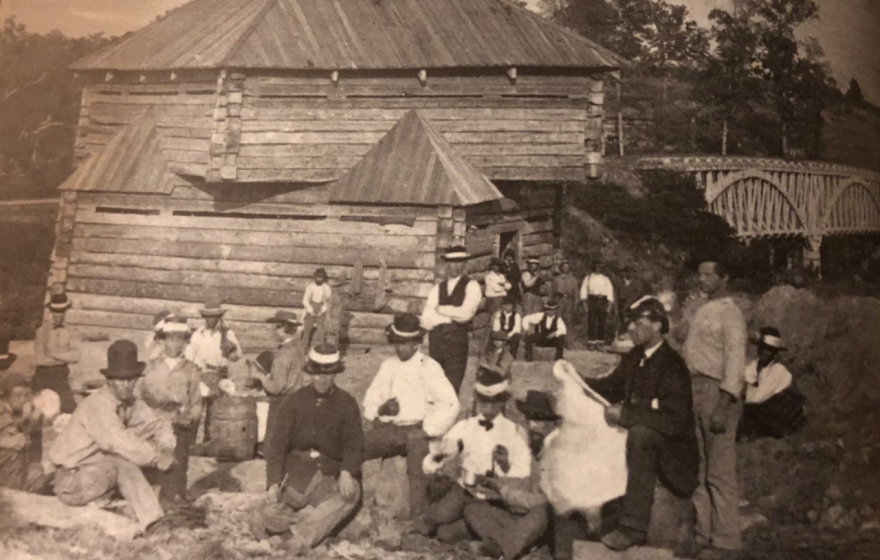During the Civil War, Archer Alexander, an enslaved Black man in St. Charles County, overheard Confederate sympathizers discussing their plan to attack Union soldiers. Alexander escaped to warn the troops that slaveholders sawed timbers off the Peruque Creek railroad bridge in St. Charles County that Union forces used to transport soldiers and military supplies.
Alexander’s quick thinking saved the lives of many Union soldiers, but he risked his life, as well as the lives of his wife and children, by doing so.
On Saturday, St. Charles County officials will hold Archer Alexander Day to honor him and recognize his heroic act. His descendants also will hold a memorial service at St. Peter’s United Church of Christ Cemetery in Normandy, where he was buried in 1880.

Missouri Historical Society
/
Even though Alexander is memorialized in Lincoln Park in Washington, D.C., his story is not well known even in the St. Louis region, said Dorris Keeven-Franke, a local historian who has researched Alexander for decades and is writing a book about his life.
“It’s only been in recent years that we’ve started working to make sure that the stories of Black people and especially those enslaved have been told,” Keeven-Franke said. “We don’t have enough of them.”
She hopes the memorial service and celebration will increase awareness of Alexander’s life and the role he played during the Civil War.
St. Louis Public Radio’s Andrea Henderson spoke to Keeven-Franke about why it’s important to honor Alexander.
Andrea Henderson: How significant is it for a formerly enslaved Black man to be memorialized in Missouri?
Keeven-Franke: I think it’s very significant. Because this man achieved this through his bravery, and his bravery was something that any person would have a difficult time. Any person doing what Archer did would be a hero, and an enslaved man, it was even more risky, more dangerous and more opportunities to lose his own life.
Henderson: In recent months, white parents have criticized the way schools teach students about race and history. After all of the research that you have uncovered about Archer’s life how do you think that his life or slavery should be taught to people if it’s not talked about in schools?
Keeven-Franke: It should be taught accurately, it should be the whole truth should be told. This is a story of heroism that young people can look up to today. And if we do not discuss this subject, how are they ever going to learn stories such as this?

State Historical Society of Missouri
/
Henderson: As a genealogist and historian, you say you like to share difficult stories of people and places that can help them connect with their past. How does Archer’s story help Black families in the area connect with history? And how does it teach white families in the region about Missouri’s racist past?
Keeven-Franke: I think what’s important about everyone learning Archer’s story is we learned that things were not as easy and as cut and dried or black and white as we would like to believe that the times were difficult. People have very difficult choices to make. And not everybody. It was capable of doing the choices, making the choices. … I think the other reason as a genealogist is that in the last 10 years, as my research, focus has changed. It’s important for Black families to also understand that it’s not impossible to research and learn these stories that there are methods.

Dorris Keeven-Franke
/
Henderson: People often hear stories of famous Black Civil War heroes like Harriet Tubman or Frederick Douglass, but there are many untold stories. What makes Archer’s story so different?
Keeven-Franke: Archer’s story is different in the fact that a something called the Second Confiscation Act, which is not often discussed, Archer was not emancipated because of Lincoln’s Emancipation Act, because in Missouri, that was not a valid way of achieving emancipation. He did not sue for his act of freedom, he did not just flee, or be actively involved in, in the Underground Railroad in that manner. What he did was report the treason and the disloyal acts that his owner had done.
Henderson: Why do you feel like his story is so important to tell?
Keeven-Franke: It’s only been in recent years that we’ve started working to make sure that the stories of Black people and especially those enslaved have been told. We don’t have enough of them, so that’s the important reason.
Follow Andrea on Twitter: @drebjournalist
